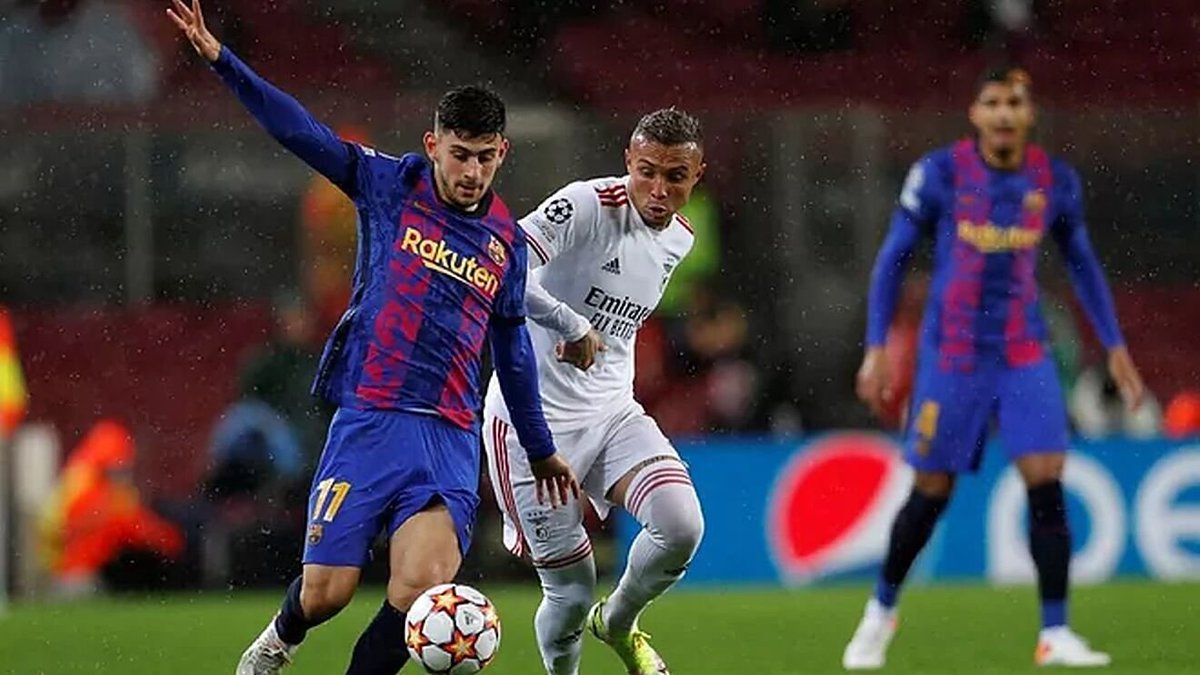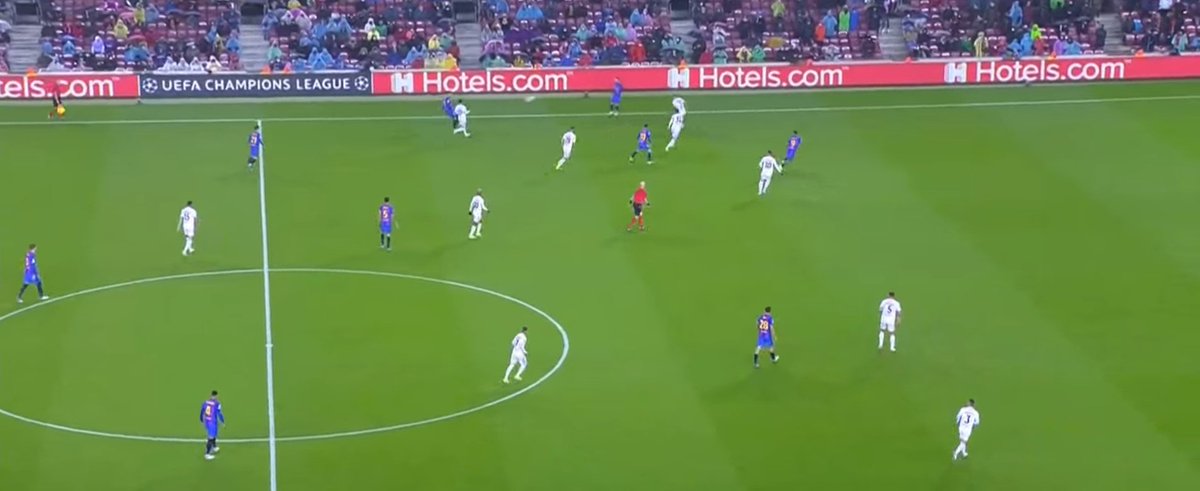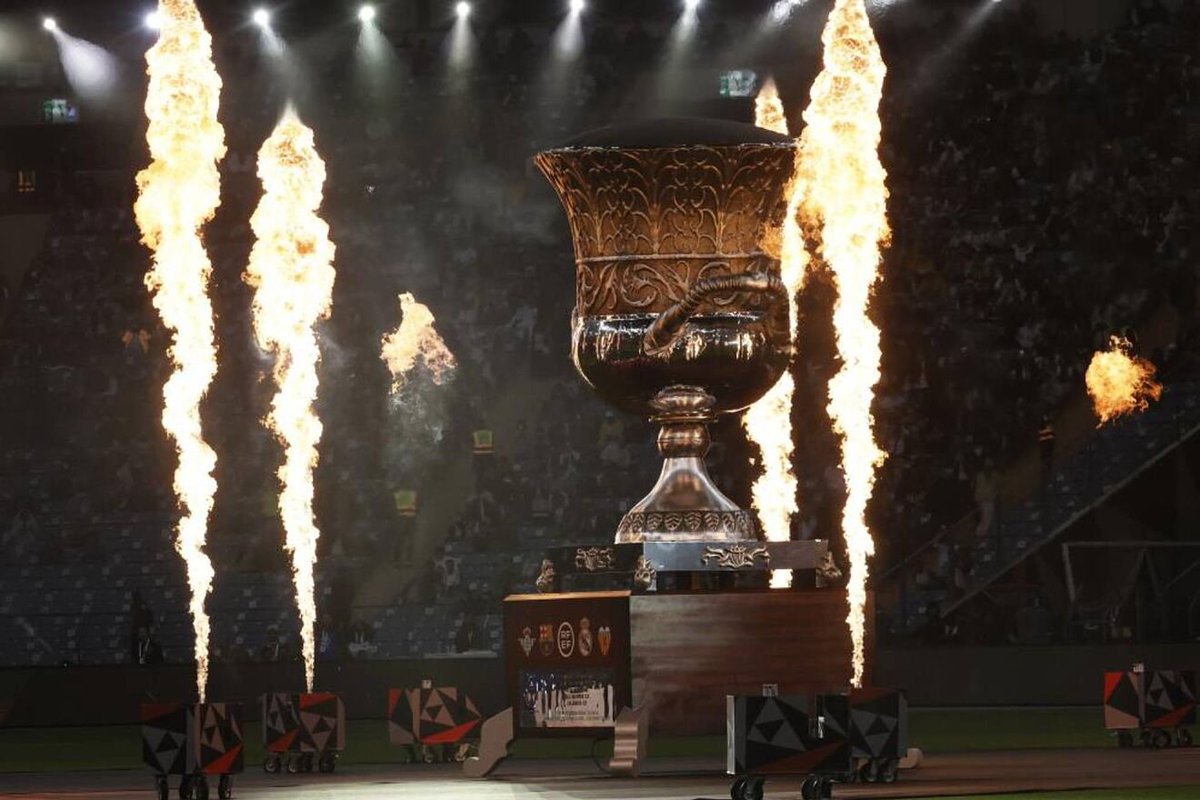Barcelona-Benfica:
Success in failure and why yesterday's draw was beautiful in its own way.
#JdPExplains
[THREAD]
Success in failure and why yesterday's draw was beautiful in its own way.
#JdPExplains
[THREAD]

Similar patterns repeated right away as Demir and Alba were tasked as width-holders on either wing, both with significant responsibilities they managed well. Gavi once again enjoyed runs in his opponent's blind-stop, helping Barcelona open up – i.e Nico in this situation. 

Benfica pressured Barcelona well in the opening phase, but Lenglet's outreach combined with his teammates dropping deep meant that Benfica's pressure could easily be bypassed without losing too many men in advanced zones. A pattern Xavi's team @ Al-Sadd shared. 

The situation above led to an easy counter for Barcelona as FdJ took advantage of the situation to burst forward w/ the ball (i.e what he does best!) while his teammates accompanied him to split up Benfica's defense. If the last move didn't go through, it's an improvement. 

A reason explaining Barcelona's frequent build-up through the right is Nico's involvement, picking the ball from deep while forward split Benfica's defense after bypassing the midfield. Bot Depay and Demir are running while Nico has time to make the pass, frequently to Demir. 



As a consequence of Barcelona's organized transitions through structured pressing, Busquets found it easy to dispossess Benfica's midfielders. All he had to do was stretch his legs and the ball was his. It frequently happened, as Benfica rarely had to run much backwards. 

Busquets found himself in possession of the ball fairly high (!= w/ Koeman) which meant he had more options on the ball. The sequence itself comes from a passe of Piqué who received the ball after a 'quality' back-pass, enabling build-up through another player. 

This allowed to disorganize/exhaust Benfica's players from the very beginning as they were forced to track Barcelona's numerous passing options. As a consequence, Busquets, FdJ or Nico had more time to decide which passing option was the best. Rushing is never good.
Lenglet often used deception as a progressive tool to eliminate those pressing him: As Barcelona switched from Araujo to Lenglet, Benfica assume Lenglet will continue to Jordi Alba. Forgotten was the vertical pass towards Depay – though it was not completed, the idea was there. 

An outlet that is not often mentions in the build-up through the right is Ronald Araujo. In the first frame, he dispossesses his marker at the half-way line.
In the second frame, he is running free as if he was a regular winger. His acceleration is exceptional.

In the second frame, he is running free as if he was a regular winger. His acceleration is exceptional.


Gavi's spinning-top skills helped Barcelona switch sides more effectively through variations in tempo. A few passes later, Nico's positioning and Gavi's run allows Demir into a 1v1 situation.
He may not have won, but the wide players get the 1v1 situation. That's key for Xavi.

He may not have won, but the wide players get the 1v1 situation. That's key for Xavi.


What also worked for Barcelona was invitation. There's time. Let the opponent come. In this case, Barcelona's higher midfield drops deep to attract Benfica's lines, to ensure the space between the forwards and the defense is large enough to be exploited by the original passer. 

Memphis didn't exactly have a great game overall, but among the issues, communication was a big one. Memphis often invited for a long-ball, but he rarely was ready. His request and legs were not on the same wavelength. Depay here should have requested before. 

Had he done so, he's be further up running and there's enough time for the ball-holder to release any time he wishes, where as Depay's acceleration is less controllable. He was often too late on certain actions despite originally asking for those in the first place.
Most obviously was the complication of Memphis' actions in the box regrettable, where he goes for a weak pass instead of the shot after dribbling his way through. This situation is a case where he requests the ball at a good time to eliminate his opponents, though. 

While Araujo was busy marking his man higher up – being the most up to it in the entire backline – Piqué filled a similar role to previously mentioned, that of a space-sweeper. Piqué understand the zone that could become dangerous (i.e in behind Araujo) and anticipates well. 

Defense is offense. Offense is defense. Barcelona stringed together passes under pressure for the simple reason that the distance was small enough to reach the teammate, but big enough to occupy different zones. Zig-zaging through Benfica was only a matter of a few ball-kicks. 

The reason behind Benfica failing to bypass Barcelona's last line was prevention. Barcelona was organized enough to keep midfielders while defenders still had a relative line that isolated Benfica very quickly. As a consequence, many of Benfica's attempts were stopped early. 

Benfica almost always played long (here's one of the rare occasion where the goalkeeper doesn't directly fire it away) & Barcelona can focus on one wing only as it has blocked lanes to the other side. Barcelona's ball-winning methods scared Benfica away & gave away more balls. 

Benfica also failure to pressure Barcelona efficiently despite multiple attempts to press the centre-backs as they rarely covered lanes to Busquets. The midfielder was often free and the pass was often found, eliminating three men in a simple pass – to Barcelona's advantage. 

Because Busquets passes to Alba in a diagonal manner, Benfica are easily focused on the ball-holder, Jordi. But Gavi remained an outlet to distract Benfica as he ran behind their back, causing mayhem in Benfica's communication. 

Gavi ran behind and he's suddenly behind his mark, Alba can easily complete the pass and it's an easy 1v1 for Gavi now. As it can be seen in the second frame, Gavi is waiting for the ball inside the box, and only misfortune will prevent Barcelona from scoring. 



More Lenglet-space-grabbing. Quickly noticed how the left had unoccupied space, easy to then burs forward with it. Being a 'natural' LCB helped him take advantage and is most likely behind Xavi's choice of Lenglet on the line-up. 

Classical Dembélé situation, where he managed to get behind his opponent thanks to his feet, and for once crosses really well – that's where many forget FdJ's athleticism. Incredible how he gets the headers – lack of luck denies him the header. 

But there's also occasions where I dislike Dembélé's decision-making, who prefers to request for the ball at his feet instead of running behind and requesting it behind his marker. Means he gets the dribble + cross, but its so much more complicate. Needs to improve there. 

The game was mostly under Barcelona's control and total dominance – even if that last minute chance scared so many away.
I hope you enjoyed reading the thread as much as I enjoyed writing it.
I hope you enjoyed reading the thread as much as I enjoyed writing it.
• • •
Missing some Tweet in this thread? You can try to
force a refresh






